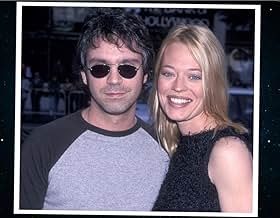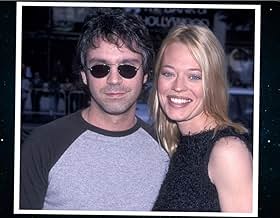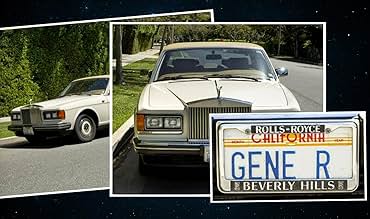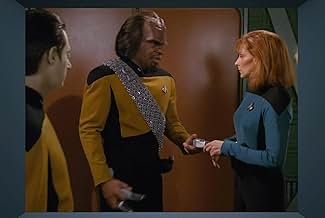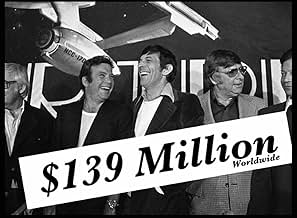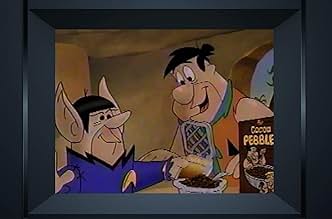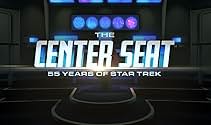Ajouter une intrigue dans votre langueChronicles rare and fascinating details of how "Star Trek" began, where it's been, and how it's going where no television series has gone before.Chronicles rare and fascinating details of how "Star Trek" began, where it's been, and how it's going where no television series has gone before.Chronicles rare and fascinating details of how "Star Trek" began, where it's been, and how it's going where no television series has gone before.
Parcourir les épisodes
Avis à la une
I can't say that I'm happy with my assessment and I'm sure most others won't be as well, but the pace and editing of this first episode are so bad that I'm having trouble finishing it and may not watch the other three I've recorded.
In Philadelphia, there is the Franklin Institute, a center for science, scientific history, science demonstrations, and industrial scientific testing. It's quite a place and I've gone there since I was very young. It's been a while since I visited, but the last time I was there, drinking in the exhibits around me, I watched as schoolchildren too immature to understand what they were seeing absolutely raced from exhibit to exhibit trying to find the button to push to make the display do something. They would rush up to it, frantically hammer away at whatever initiated the demo, and hunted to see what would happen. If it moved, lit up, make a sound or whatever, they watched for five seconds. If pushing the button didn't result in an INSTANT payoff...two seconds, then on to the next exhibit. Nobody stopped to look, wonder, read, or try to understand what was happening.
I am sure that the editor of this series was one of those kids.
Hyper-fast cuts, contributors flashed on the screen for so short a time that you can see what they look like, what their name is, or what they are saying, pick any two, cut-ins of scenes from shows that might well be funny but go by so quickly that they are blips...this bears all the hallmarks of someone too young to know how to edit for an audience who is seeing the material for the first time, not someone who has been spending hours with each scene. It's an absolute mess. No attention span whatsoever. No depth of examination. No desire to discover, just to get to the next bullet point.
I'm going to boldly go back to the TV now. I think there may be 15 painful minutes left of the fist episode. There are other "history of Star Trek" films and videos that are not frenetic and juvenile that tell the same story.
Harlan Ellison; story of how unhappy he was with the rewrite of, "City on the Edge of Forever" is mentioned. I can only imagine how irate he' d be if he was around to see this mess.
In Philadelphia, there is the Franklin Institute, a center for science, scientific history, science demonstrations, and industrial scientific testing. It's quite a place and I've gone there since I was very young. It's been a while since I visited, but the last time I was there, drinking in the exhibits around me, I watched as schoolchildren too immature to understand what they were seeing absolutely raced from exhibit to exhibit trying to find the button to push to make the display do something. They would rush up to it, frantically hammer away at whatever initiated the demo, and hunted to see what would happen. If it moved, lit up, make a sound or whatever, they watched for five seconds. If pushing the button didn't result in an INSTANT payoff...two seconds, then on to the next exhibit. Nobody stopped to look, wonder, read, or try to understand what was happening.
I am sure that the editor of this series was one of those kids.
Hyper-fast cuts, contributors flashed on the screen for so short a time that you can see what they look like, what their name is, or what they are saying, pick any two, cut-ins of scenes from shows that might well be funny but go by so quickly that they are blips...this bears all the hallmarks of someone too young to know how to edit for an audience who is seeing the material for the first time, not someone who has been spending hours with each scene. It's an absolute mess. No attention span whatsoever. No depth of examination. No desire to discover, just to get to the next bullet point.
I'm going to boldly go back to the TV now. I think there may be 15 painful minutes left of the fist episode. There are other "history of Star Trek" films and videos that are not frenetic and juvenile that tell the same story.
Harlan Ellison; story of how unhappy he was with the rewrite of, "City on the Edge of Forever" is mentioned. I can only imagine how irate he' d be if he was around to see this mess.
I was born in the late 60s, my dad liked Star Trek TOS when I was a youngster in the 70s and so mum was ok with me watching it too. I really enjoyed the animated series at the time but quickly forgot it as when I was 11 The Motion Picture turned up. Since then there have been a succession of films and series and there's been something new in terms of Star Trek for most of my life.
Having watched now the first 5 episodes it has been wonderful to revisit the beginning, the talented and creative people and real world things that happened. Disputes, tight deadlines and plan B, C or D situations that still somehow came together to create something that has always been really special in my life and that if so many others.
It's been so interesting to see archive footage of some of the team who aren't with us anymore and also learn so many things already (only half way through) that I didn't know before.
Having watched now the first 5 episodes it has been wonderful to revisit the beginning, the talented and creative people and real world things that happened. Disputes, tight deadlines and plan B, C or D situations that still somehow came together to create something that has always been really special in my life and that if so many others.
It's been so interesting to see archive footage of some of the team who aren't with us anymore and also learn so many things already (only half way through) that I didn't know before.
With all of the thousands of actors over the years, it's difficult to get interviews and comments from everyone who is involved. It was quite the coup to get Leonard Nimoy to talk. But Why they didn't interview William Shatner, who is still alive, is beyond me. Maybe he wouldn't do it? Gates McFadden was a good choice as a narrator - I've always liked her character and her as a person. Not interviewing Avery Brooks was kind of odd because Deep Space 9 was such a different groundbreaking part of the Star Trek universe. However, one character is conspicuously absent from any mentions, and you only catch a glimpse of her face once or twice. And that is Gene Roddenberry's one time Wife: Majel Barrett , WHY? She was nurse Chapel in the original Star Trek, and Counselor, Troy's mother in Star Trek next generation. And the fact that she was the voice of the computer in many of the series, and a few movies gives her more exposure than anyone, other than perhaps, Michael Dorn . Jealousy because she was once the wife of the creator? I guess we'll never know. Otherwise, even with that slight, it was enjoyable to see. Reviewed by a true Trekker.
10XweAponX
I had to come to IMDb to determine the proper order of the episodes.
This is basically a longer version of William Shatner's great movie, "Chaos on the Bridge"
I was aware of the fact that Gene Roddenberry had been relegated to practically a fan of his own show after his failed interference with The Motion Picture and The Wrath of Khan.
And I never knew that Gene had a substance-abuse problem, it makes me relate to him a lot more, I know how terrible that can be.
This is a man who single-handedly created one of the largest television franchises ever, and then he was kicked out of it, and cheated out of his well earned royalty monies.
And he has a remarkable success story in how he clawed his way back not only his well deserved royalties but also to being in charge of Star Trek the Next Generation, through the machinations of Leonard Maislish, as told in the episode "Queue for Q". As despicable as the man appeared to be, he is responsible for one thing that we can all be thankful for: he brought John De Lancie in to play Q.
But what was good for Gene Roddenberry was not good for Star Trek the Next Generation, and we get to hear all about that in this series.
Gene personally wrote "The Cage", "The Menagerie", "The Omega Glory", some of the best episodes of the original series. And it even appears as if the original series when renewed for its third season at 10 o'clock Friday night, Lost a lot when Gene stepped down as Producer... so we can't really completely blame the horrible Friday night death slot, but also the fact that the show's main driving force was no longer involved in making the show.
But in this series, we learn about Gene's inability to write a movie script of any worth. Granted, he was a brilliant television producer and television writer. But he wrote script after script for proposed movies, and also the proposed "phase 2" television show which never happened, all miserable failures.
I could not understand how such a brilliant man could fail in this way.
But he made a big comeback for TNG, he was given back all, er, most of the authority that he lost. But he never really wrote any more episodes for television or elsewhere other than half of "Encounter at Farpoint", stepping on DC Fontana's toes in the process.
I was glad that they interviewed Diana Muldaur for this. I always thought that she had deliberately played Dr. Pulaski as if she were a female Doctor McCoy, and I always thought she was brilliant in that role. But I find it sad that she did not like working on the show, especially after adding so much to it.
Every television show has its dark spots, Trek has had its share.
It just goes to show that the cast and crew of this franchise are human beings, nothing more.
This is a brilliant and brutally honest series, expanding upon William Shatner's revelations from "Chaos on the Bridge".
But if you are watching this on Prime, come back to IMDb to find out the proper order of the episodes because they choked the duck, totally mixing up the order of the episodes so that the narrative makes no sense. I actually had to stop playback and come here to find out what was missing.
This is basically a longer version of William Shatner's great movie, "Chaos on the Bridge"
I was aware of the fact that Gene Roddenberry had been relegated to practically a fan of his own show after his failed interference with The Motion Picture and The Wrath of Khan.
And I never knew that Gene had a substance-abuse problem, it makes me relate to him a lot more, I know how terrible that can be.
This is a man who single-handedly created one of the largest television franchises ever, and then he was kicked out of it, and cheated out of his well earned royalty monies.
And he has a remarkable success story in how he clawed his way back not only his well deserved royalties but also to being in charge of Star Trek the Next Generation, through the machinations of Leonard Maislish, as told in the episode "Queue for Q". As despicable as the man appeared to be, he is responsible for one thing that we can all be thankful for: he brought John De Lancie in to play Q.
But what was good for Gene Roddenberry was not good for Star Trek the Next Generation, and we get to hear all about that in this series.
Gene personally wrote "The Cage", "The Menagerie", "The Omega Glory", some of the best episodes of the original series. And it even appears as if the original series when renewed for its third season at 10 o'clock Friday night, Lost a lot when Gene stepped down as Producer... so we can't really completely blame the horrible Friday night death slot, but also the fact that the show's main driving force was no longer involved in making the show.
But in this series, we learn about Gene's inability to write a movie script of any worth. Granted, he was a brilliant television producer and television writer. But he wrote script after script for proposed movies, and also the proposed "phase 2" television show which never happened, all miserable failures.
I could not understand how such a brilliant man could fail in this way.
But he made a big comeback for TNG, he was given back all, er, most of the authority that he lost. But he never really wrote any more episodes for television or elsewhere other than half of "Encounter at Farpoint", stepping on DC Fontana's toes in the process.
I was glad that they interviewed Diana Muldaur for this. I always thought that she had deliberately played Dr. Pulaski as if she were a female Doctor McCoy, and I always thought she was brilliant in that role. But I find it sad that she did not like working on the show, especially after adding so much to it.
Every television show has its dark spots, Trek has had its share.
It just goes to show that the cast and crew of this franchise are human beings, nothing more.
This is a brilliant and brutally honest series, expanding upon William Shatner's revelations from "Chaos on the Bridge".
But if you are watching this on Prime, come back to IMDb to find out the proper order of the episodes because they choked the duck, totally mixing up the order of the episodes so that the narrative makes no sense. I actually had to stop playback and come here to find out what was missing.
Overall it had a lot of ground to cover so kudos there. I did not care for the short takes and goofy approach - whoever decided to take that tack I think a bit over used.
One thing that I noticed after the last episode was besides mentioning the music themes was the lack of the music scoring in general - specifically TOS incidental music - name any show you can recall the music during the episodes (maybe outside of Mission Impossible) that you can, years later, recall the music... Klingon theme, Doomsday/Immunity Syndrome theme, 'spore' music, etc.
Other than that not addressed, it was a decent show. Gates did good job narrating.
And yes Enterprise theme stunk - made me not want to watch.
One thing that I noticed after the last episode was besides mentioning the music themes was the lack of the music scoring in general - specifically TOS incidental music - name any show you can recall the music during the episodes (maybe outside of Mission Impossible) that you can, years later, recall the music... Klingon theme, Doomsday/Immunity Syndrome theme, 'spore' music, etc.
Other than that not addressed, it was a decent show. Gates did good job narrating.
And yes Enterprise theme stunk - made me not want to watch.
Le saviez-vous
- AnecdotesDuring the history of Star Trek V, there was no mention about Lawrence Luckinbill (Sybok) for one reason. There was a mention of Lucille Ball who gave Star Trek TOS life on TV; Kirstie Alley (Saavik on Star Trek II) who met and played with Lucille Ball on a game show; and when it came to Lawrence Luckinbill, the only mention was Sean Connery was considered the role of Sybok. Not mentioned was Lawrence Luckinbill (married to Lucie Arnaz) was the son-in-law of Lucille Ball who gave Star Trek TOS life on TV.
Meilleurs choix
Connectez-vous pour évaluer et suivre la liste de favoris afin de recevoir des recommandations personnalisées
- How many seasons does The Center Seat: 55 Years of Star Trek have?Alimenté par Alexa
Détails
- Date de sortie
- Pays d’origine
- Langue
- Aussi connu sous le nom de
- Inside Star Trek: Hinter den Kulissen des Enterprise-Universums
- Société de production
- Voir plus de crédits d'entreprise sur IMDbPro
- Durée46 minutes
- Couleur
Contribuer à cette page
Suggérer une modification ou ajouter du contenu manquant



